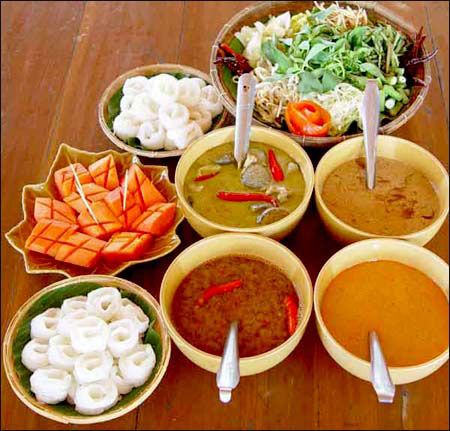Buddhism and Vegetarianism
From John Kahila

Are all Buddhists vegetarians?
No. The First Precept admonishes us to refrain from killing, but meat eating is not regarded as an instance of killing, and it is not forbidden in the scriptures. (We are speaking here mainly of the Pali scriptures. Some of the Mahayana scriptures, notably the Lankavatara Sutra, take a strong position in favor of vegetarianism. Also see Note below)
As recorded in the Pali scriptures, the Buddha did not prohibit consumption of meat, even by monks. In fact, he explicitly rejected a suggestion from Devadatta to do so. In modern Theravada societies, a bhikkhu who adheres to vegetarianism to impress others with his superior spirituality may be committing an infringement of the monastic rules.
On the other hand, the Buddha categorically prohibited consumption of the flesh of any animal that was “seen, heard or suspected” to have been killed specifically for the benefit of monks (Jivaka Sutta, Majjhima Nikaya 55). This rule technically applies only to monastics, but it can be used as a reasonable guide by devout lay people.
To understand this “middle path” approach to meat-eating, we have to remember that there were no “Buddhists” in Shakyamuni’s time. There were only mendicants of various kinds (including the Buddha’s disciples), plus lay people who gave them alms out of respect without necessarily worrying about the brand name of the teachings.
If meat was what a householder chose to offer, it was to be accepted without discrimination or aversion. To reject such an offering would be an offense against hospitality and would deprive the householder of an opportunity to gain merit — and it could not benefit the animal, because it was already dead. Even the Jains may have had a similar outlook during the same period of history, despite the strict doctrine of ahimsa.
Vegetarianism could not become a source of serious controversy in the bhikkhu sangha until the rise of fixed-abode monastic communities in which the monks did not practice daily alms-round. Any meat provided to such a community by lay people would almost certainly have been killed specifically for the monks. That may be one reason for the difference in Mahayana and Theravada views on meat eating — the development of monastic communities of this type occurred principally within Mahayana.
The issue of meat eating raises difficult ethical questions. Isn’t the meat in a supermarket or restaurant killed “for” us? Doesn’t meat eating entail killing by proxy?
Few of us are in a position to judge meat eaters or anyone else for “killing by proxy.” Being part of the world economy entails “killing by proxy” in every act of consumption. The electricity that runs our computers comes from facilities that harm the environment. Books of Buddhist scriptures are printed on paper produced by an industry that destroys wildlife habitat. Worms, insects, rodents and other animals are routinely killed en masse in the course of producing the staples of a vegetarian diet. Welcome to samsara. It is impossible for most of us to free ourselves from this web; we can only strive to be mindful of entanglement in it. One way to do so is to reflect on how the suffering and death of sentient beings contributes to our comfort. This may help us to be less inclined to consume out of mere greed.
All of that having been said, it cannot be denied that the economic machine which produces meat also creates fear and suffering for a large number of animals. It is useful to bear this in mind even if one consumes meat, to resist developing a habit of callousness. Many Buddhists (especially Mahayanists) practice vegetarianism as a means of cultivating compassion.
The Jivaka Sutta hints that one could also make a good case for vegetarianism starting from any of the other brahmaviharas (loving-kindness, sympathetic joy, equanimity). Interestingly, it is loving-kindness rather than compassion that is mentioned first in the Jivaka Sutta.
If you are considering trying out vegetarianism for the first time, we suggest discussing it with someone who has experience. There are a few issues that ought to be considered regarding balanced diet, etc.
Note (by Binh Anson): The Lankavatara Sutra, although recorded the Buddha’s teaching in Lanka (Sri Lanka), is essentially a product of later Mahayana development. According to H. Nakamura (Indian Buddhism, 1987), there are several versions of this sutra, one fairly different in content from the other. Most scholars concluded that this sutra was likely compiled in 350-400 CE. In addition, according the the popular Zen master D.T. Suzuki (The Lankavatara Sutra – A Mahayana Text, 1931), the chapter dealing with meat eating was indeed added much later in subsequent versions. He also agreed that this sutra was not the authentic words by the Buddha, but was compiled much later by unknown authors following Mahayana’s philosophy.
Source : www.urbandharma.org




